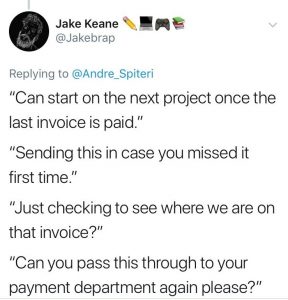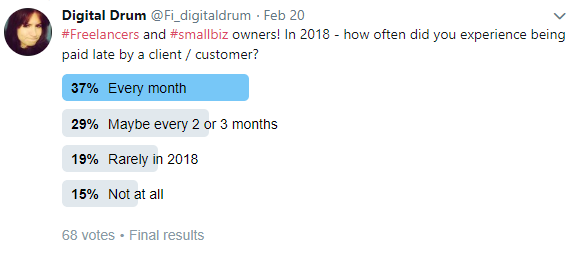Did you know that the self-employed and freelance population contributed £271 billion to the UK economy in 2017? Yes, that’s right – we’re a very important, active segment of the business world.So why are so many of us getting messed about when it comes to getting paid?I spent some time this month speaking to different people about their experiences, and how late (or even, ‘non’) payments can have a negative effect on their lives.I also spotted two of my content-writing peers speaking about it on Twitter. Any of these sound familiar?

Thought so.And from being told that your invoice ‘has been paid now’ (and finding it hasn’t) to being asked to change your payment terms from 14 days to a mammoth 60 days – freelancers and self-employed people with small businesses have been experiencing it all.
I ran a ‘finger in the air’ Twitter poll recently...

37% said they were paid late by someone ‘every month’ throughout 2018, whilst a further 29% said it happened roughly ‘every two to three months during last year.’Whilst this is only meant to be a snapshot view, maybe it is sufficiently indicative of how prevalent the issue is. I should say at this point that not all clients deserve a bad rap; many are good customers and will always pay their bill by the deadline (and without any quibble). Despite this though, the instances of bad treatment I read about online were also plentiful.
I spoke to a bid consultant who is currently owed £8k
She told me that this had proved challenging to her cash flow, and at the time of speaking to her, one of her invoices (totalling 5.5k) had already reached 32 days beyond her 30-day payment deadline. The person in charge of paying people at her client’s company had queried the work she’d completed; asking for proof that the work was authorised to proceed.Luckily, my contact had kept an email trail (and Harvest timesheets) on everything, so she was ‘covered’ in terms of having to give evidence to her client – but it meant she had to waste precious time trawling through her inbox to dig things out. “The relationship is broken beyond repair. I can understand how people can end up feeling ill with this sort of pressure on them. Fortunately, I have a good network of people to speak to.”My contact already had a contract in place with her client - but despite this, she was treated badly.She’s not just sitting back and taking it though - she’s already researched debt collection options and sought advice from several different sources, including the local Chamber of Commerce.She’s also submitting the case to the Government’s Small Business Commissioner (launched in 2017 to ensure fair payment practices for Britain's 5.7 million small businesses and support them in resolving their payment disputes with larger businesses.)
‘Lucy’ is owed nearly 2k
Another person I spoke to, ‘Lucy’, is a costume designer. She is still awaiting payment of nearly £2k from a client she finished delivering work to, back in autumn 2018.“We were relying on the payment to help settle the last of our wedding bill. It has meant we haven't been able to have a honeymoon - or even a weekend away - because we don't have the money we thought we’d have by now.”Lucy told me that she and her husband are now ‘stuck’ in their overdrafts. In fact, they’ve only just been able to settle their rent and council tax bill. “We are basically reliant on my husbands’ income, as I am still starting out and building my client base.”Despite the massive inconvenience it's caused her, she is somewhat understanding about it all. An investor had pulled out from her client’s project, and this was the main cause for the delay.“It’s something that is remarkably common in my industry, especially when an investor pulls out without warning. Everyone is left in the lurch and it’s hard to cover the shortfall it leaves people like me with.“I have now reworded my invoice terms and conditions, so from now on, late fees are added if payment is not made within 30 days.”What’s been clear from hearing several freelancer stories recently is that, whilst some almost believe that being paid late is just ‘goes with the territory’ and seem to sort of accept it, many of you are not afraid to escalate things and take action in court if non-payment happens. And rightly so.Some had taken on their clients through the small claims court process, although the outcome often seemed to vary.
Not everyone manages to claw back what they are owed
Self-employed graphic designer Nik Jones is a case in point. She experienced payment problems with her first-ever client, and she ended up taking out a County Court Judgement (CCJ), but unfortunately, she couldn’t recoup her money:“It was horrible. The client had his back well and truly covered, and even bailiffs couldn't get anything.“He (the client) had kept saying if I “pay you this, can you do this for me”, so I did. No payment was taken upfront.“Then, when it came to payment time, he made excuse after excuse. I was still in contact with him for about another two years or so, but only communicating regarding me receiving what was owed to me. I remember feeling absolutely wretched and out of control the whole time we corresponded.“The client 'set up a payment plan', but it was on his terms and he rarely paid any more than about £50 a time. In the end, I probably got about £200 back out of the total of £1,500 I was owed.”
Late or non-payments can affect more than just your wallet
Your mental and physical health can be negatively affected too. Comments on Facebook describing the challenges of chasing money included words and phrases such as “mentally draining”, “demotivating”, “stressful” and “powerless and frustrated.”One person even said that it made them “feel down about freelancing in general” – and in another case, about themselves.Here are just a few of the other comments I read:“It would make me question myself, which was irritating.”“It used to drive me insane and create a lot of worry.” “Sometimes I feel a bit disrespected - depending on the client.”
Protecting yourself against late or non-payment
- Make your payment terms clear, right from the first conversation. Whilst many of us can be quite laid back in our dealings, it pays to talk about ‘the boring stuff‘ up front (preferably via email, so you’ve got everything in writing). The professional ‘boundaries’ are then set, right from the off.
- Ensure that you’ve got a solid contract in place with your client. If possible, include clear terms for late payment, so that your client is discouraged from delaying payment.
- Send your invoices out on time, every time. Issuing your paperwork promptly means that you’ll know exactly when that payment window is up, and when to send your pre-deadline reminder emails - if needed. Even better, use a business banking app which not only collects payments but includes an invoicing function so that you can automate those reminders should they be required! (It may also save you some precious time.)
- Evaluate clients who have previously paid you late. If you find you’re still being paid late on a continuous basis, and you already have a niggling doubt about the client’s long-term levels of integrity anyway, consider whether you are willing to continue delivering work for this company or organisation.
- Consider taking at least a deposit upfront, on each job. Some clients won’t be happy to do this until they’re comfortable with you as a supplier, but it may be worth asking the question anyway.
- Stay connected to your peer network. Whilst it may not seem like an obvious way of avoiding late payments, you actually might pick up some insight and helpful tips through just being part of relevant freelance or small business networks – whether it’s on Twitter, Facebook, LinkedIn, Slack or even via face-to-face ‘meet-ups’. This also includes professional memberships.
There are many ‘peer resource’ sites you can access for insight and advice, including:
- Freelance Heroes
- Freelance Folk
- Doing It For The Kids (DIFTK)
- Being Freelance
- Work Notes
- Underpinned
- Coconut’s Knowledge Hub
Finally…
Even if you’ve got all the checks and measures in place to reduce the likelihood of being paid late, it’s never going to be 100% preventative - you may still end up being messed about. You deserve to be paid on time if you’ve fulfilled your end of the bargain. Freelancing isn’t free, and small businesses can ‘sink or swim’ based on cash flow.Above all else, don't forget to ask for support from the right people. Remember, you are not on your own.










